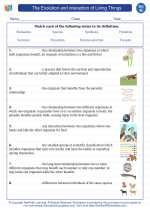The Evolution and interaction of Living Things -> genetic
Introduction to Genetics
Genetics is the branch of biology that deals with the study of genes, genetic variation, and heredity. Genes are the basic units of heredity and are made up of DNA. They contain the instructions for building and maintaining an organism, and they determine the traits that an organism will have.
Gregor Mendel and the Laws of Inheritance
Gregor Mendel, an Austrian monk, is often referred to as the "father of genetics" for his work with pea plants in the 19th century. He formulated the basic principles of heredity through his experiments, which laid the foundation for the modern study of genetics. Mendel's laws of inheritance include the law of segregation and the law of independent assortment.
Genetic Variation and Mutation
Genetic variation refers to the differences in DNA sequences among individuals within a population. This variation is essential for evolution and adaptation to changing environments. Mutations are the ultimate source of genetic variation and can occur spontaneously or be induced by environmental factors.
Chromosomes and Inheritance
Chromosomes are structures within cells that contain genetic information. In humans, each cell typically contains 23 pairs of chromosomes. These chromosomes carry genes that determine specific traits. Inheritance patterns can be influenced by the location of genes on chromosomes and the types of chromosomes involved.
Genetic Disorders and Genetic Counseling
Genetic disorders are conditions that are caused by abnormalities in an individual's DNA. These disorders can be inherited from one or both parents, or they can arise from spontaneous mutations. Genetic counseling is a service that provides information and support to individuals and families who have or are at risk of genetic disorders.
Applications of Genetics
Genetics has numerous practical applications, including agriculture, medicine, and biotechnology. It has led to advancements in selective breeding of crops and livestock, the diagnosis and treatment of genetic diseases, and the development of genetically modified organisms.
.◂Science Worksheets and Study Guides Eighth Grade. The Evolution and interaction of Living Things

 Worksheet/Answer key
Worksheet/Answer key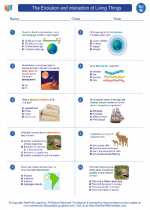
 Worksheet/Answer key
Worksheet/Answer key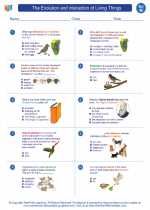
 Worksheet/Answer key
Worksheet/Answer key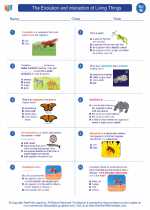
 Vocabulary/Answer key
Vocabulary/Answer key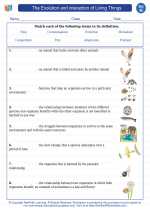
 Vocabulary/Answer key
Vocabulary/Answer key